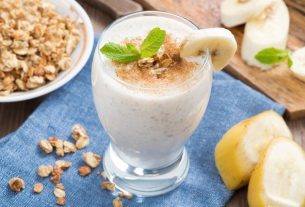Some ways to stop or reduce the desire to eat sweets are to increase the consumption of foods that give a greater feeling of satiety, reduce hunger, balance blood sugar levels or that stimulate the production of serotonin, which is a substance related to feeling of well-being and pleasure, like bananas, oats or chestnuts, for example.
Furthermore, increasing the consumption of foods that improve the health of the intestinal flora, such as natural yogurt and probiotics, increases satiety and contributes to weight loss, in addition to reducing the desire to eat sweeter foods.
It is important to highlight that in addition to diet, it is also necessary to do physical activity regularly to improve hormonal production and reduce stress and anxiety, which helps to reduce the desire to eat sweets and reduces the risk of developing diabetes, cardiovascular diseases, cancer and cavities.
Check out the following video for some tips on how to stop eating sweets:
1. Eat less sweet sweets
Eating less sweet sweets or less sugary foods and drinks is an excellent tip to stop eating sweets permanently. This is because by gradually reducing the degree of sweetness of food, the taste becomes more adapted so that you no longer feel like eating such sweet foods.
Good ways to eat less sweet foods are to reduce the amount of sugar in your coffee, for example, instead of adding 3 spoons of sugar, you can reduce the amount over time.
2. Eat foods rich in protein and good fats
Foods rich in protein and good fats, such as lean meat, fish, eggs, full-fat dairy products, avocados, soybeans and nuts, increase the feeling of satiety, reduce hunger and help balance blood sugar levels, which contributes to reduce the desire to eat sweets.
A good option to increase your consumption of these foods is to eat a boiled egg for breakfast, add chicken or turkey breast, tuna, salmon or cheese to your salad at lunch or take a sugar-free avocado smoothie for an afternoon snack. for example. Check out the complete list of protein-rich foods.
3. Eat natural yogurt daily
Natural yogurt does not contain sugar or artificial additives or colorings and is prepared from the fermentation of milk by good bacteria that use lactose as a source of energy. When a person consumes natural yogurt daily, there is an increase in the amount of good bacteria that reaches the intestine, forming an increasingly healthier flora. This is important for those who want to stop eating sweets because the imbalance of intestinal flora sends stimuli to the brain that increase the desire to eat sweets.
A good way to gradually include natural yogurt in your diet and adapt your palate to the taste of yogurt is to use it with jellies, smoothies with fruit or prepare a jelly with natural yogurt. Additionally, you can add oats or chia to give a greater feeling of satiety and thus reduce the desire to eat sweets.
Natural yogurt can be produced at home in an easy and practical way. Learn how to prepare homemade natural yogurt.
4. Avoid industrialized drinks
Some industrialized drinks, such as soft drinks, energy drinks, juices and isotonic drinks, contain a large amount of sugar, and avoiding the consumption of these drinks greatly reduces the amount of sugar ingested per day, as the more sugar a person ingests, the greater the desire to eat sweets.
Therefore, as a way to replace industrialized drinks and reduce the desire for sweets, it is important to increase the amount of water consumed during the day, and it may also be interesting to drink sparkling water with mint or cucumber, for example, in addition to teas and unsweetened fruit juices.
Watch the video with nutritionist Tatiana Zanin with other options to replace industrialized drinks:
5. Eat every 3 hours
Eating every 3 hours and in smaller quantities helps regulate blood sugar levels and therefore reduces the desire to eat sweets. Furthermore, when the interval between meals is long, there is a lack of energy in the body, causing the brain to increase hunger and the desire to eat sweets to replenish energy.
Therefore, it is important to eat the most important meals of the day, such as breakfast, lunch and dinner, and include snacks between these meals, to avoid a sharp drop in blood sugar and the desire to eat sweets.
6. Eat whole foods
Whole foods are rich in fiber, which helps to increase satiety and balance blood glucose levels, as it allows sugar from food to be absorbed more slowly by the intestine, which helps to reduce the desire to eat sweets.
A good tip is to swap regular rice and pasta for the whole grain version, as they have more fiber in their composition, or add whole grain cereals to your diet. See healthy whole grain options.
7. Reduce consumption of simple carbohydrates
Reducing the consumption of simple carbohydrates, such as white bread, stuffed biscuits, pasta, soft drinks, cakes and snacks, causes blood glucose levels to increase and decrease quickly, making the brain understand that it is necessary to increase glucose levels in the blood and stimulates appetite and the desire to eat more sweets.
Furthermore, these simple carbohydrates cause an imbalance in the intestinal flora, which could increase the consumption of sweets. Therefore, by reducing the consumption of simple carbohydrates, it is possible to reduce the desire to eat large amounts of sugar during the day. See how to replace simple carbohydrates in your diet.
8. Eat green banana biomass
Green banana biomass is a food rich in resistant starch, a type of fiber that serves as food for good intestinal bacteria. Furthermore, fiber increases the feeling of satiety and reduces hunger, reducing the desire to eat sweets. Furthermore, bananas are rich in tryptophan, which is an amino acid used by the body to produce serotonin and which is related to the feeling of well-being and pleasure.
Biomass can be used in recipes such as cakes, brigadeiro, stroganoff and to thicken broths and soups.
See the following video on how to prepare green banana biomass:
9. Eat oatmeal
Oats are rich in fibers, such as beta-glucan, which increase the feeling of satiety, control hunger, reduce the absorption of fats and prevent sharp spikes in blood sugar levels, as they allow for slower absorption of food, which helps to reduce the desire to eat sweets.
Furthermore, oats contain inulin, another type of fiber that stimulates the reproduction of good intestinal bacteria, essential for balancing the intestinal flora and reducing the desire to eat sweets, in addition to bringing benefits such as reducing cholesterol and triglycerides, and increasing absorption of minerals in the intestine.
To increase your daily oat consumption, you can add a tablespoon to natural yogurt or blend it in a blender with milk and fruit, for example. Check out other benefits of oats and healthy recipe suggestions.
10. Eat seeds and nuts
Seeds such as chia, flaxseed, sesame and sunflower seeds are rich in magnesium, which is a mineral that stimulates the production of serotonin, a hormone that gives a feeling of well-being and improves mood, helping to reduce the desire for sweets. Chestnuts and other oilseed fruits, such as almonds, hazelnuts and walnuts, in addition to being rich in magnesium, also contain zinc, selenium and omega-3, essential nutrients to reduce stress and anxiety, making you want to eat sweets as well. stay controlled.
11. Eat more fruit
Fruits are rich in fiber that increases satiety and reduces the absorption of sugar in the intestine, which helps to balance blood sugar levels and reduce hunger and, therefore, reduces the desire to eat sweets.
A good way to increase your fruit consumption is to eat it as a dessert or add it to small snacks with natural yogurt or smoothies.
12. Take probiotics in capsules
Probiotics are good bacteria for the intestine and, in addition to natural foods such as yogurt, kefir and kombucha, they can also be found in the form of capsules or powder, and can be used as supplements in the diet.
When taking these supplements, the probiotic bacteria build a healthy intestinal flora, which helps regulate the stimuli sent to the brain to eat more sugar and, therefore, help reduce the desire to eat sweets.

Sign up for our newsletter and stay up to date with exclusive news
that can transform your routine!
Warning: Undefined array key "title" in /home/storelat/public_html/wp-content/plugins/link-whisper-premium/templates/frontend/related-posts.php on line 12
Warning: Undefined array key "title_tag" in /home/storelat/public_html/wp-content/plugins/link-whisper-premium/templates/frontend/related-posts.php on line 13




